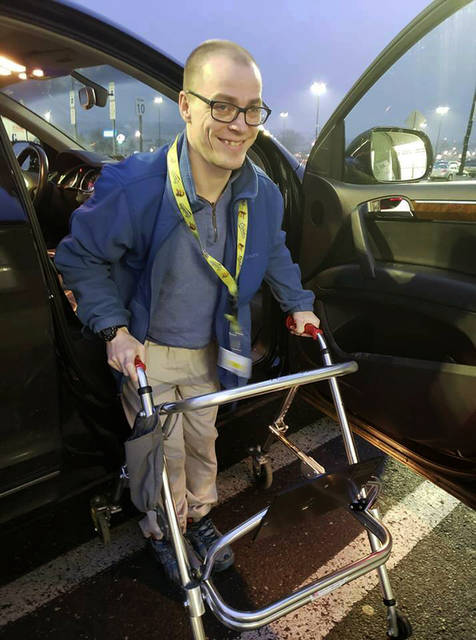Pretty much anyone who shops at the Walmart in Selinsgrove, Pennsylvania, knows store greeter Adam Catlin, who’s been welcoming customers with a huge smile and a hearty hello for more than a decade.
But Catlin, who has cerebral palsy, fears he’ll soon be out of work after the store manager told him his job description was changing — and would now include tasks he’s physically unable to do.
“It was a shock,” Catlin, 30, said Wednesday in a phone interview. “I never saw it coming.”
Neither did Catlin’s family. They say that Walmart is acting heartlessly toward one of its most dedicated workers. Walmart says it’s hoping to keep him in the store.
Catlin has served in the traditional “people greeter” role since graduating from high school. But at many Walmart locations, the job has morphed into that of “customer host,” and those workers are now responsible for helping with returns, checking receipts to help prevent shoplifting, and keeping the front of the store clean.
Catlin, who uses a walker and is legally blind, said he was told by store management that, come late April, he’d need to be able to lift at least 25 pounds (11 kilograms), stand for long periods, write reports, and read receipts in order to be able to stay on as a customer host.
“I wouldn’t be able to,” he said.
Catlin’s plight became public after his mother, Holly Catlin, wrote about it on Facebook on Monday night. Her post has been shared thousands of times, with longtime customers and strangers alike expressing outrage at the retailer. Catlin is so associated with the Selinsgrove Walmart that he cut the ribbon at the store’s grand reopening and is often recognized when he’s out and about.
“Everybody loves him. He just lights up the whole place like a full moon,” said Walmart shopper Ellen English, 51. “They can’t do that to Adam.”
Walmart spokesman Kory Lundberg called Catlin a “valued member of the team and part of what makes our Selinsgrove store special.” In a statement Wednesday, he said Walmart is “looking for a solution that keeps him in the store.”
Under federal law, employers must provide reasonable accommodations to workers with disabilities. The law requires an “interactive process” between employer and employee to evaluate requests to be accommodated. Catlin’s family said a Walmart store manager, a human relations manager and an official at corporate headquarters called Wednesday afternoon to discuss the situation.
“This job is his main thing in his life, it’s his driving force, it’s his heart,” said his sister, Amber Piermattei. “It just gives him self-worth to get up and punch that clock like everybody else and be in the community. … He’s dedicated to this place, and for them to just sweep him out the door because he has different abilities, I think, is a disgrace.”
Catlin isn’t the first Walmart greeter with a disability to be impacted by the changeover to customer host. In 2016, Danny Ockenhouse, who uses a wheelchair, said he lost his greeter’s role at a Walmart in East Stroudsburg, Pennsylvania, because he couldn’t keep up with the newly physical demands of the job.
“I just want my job back, and I want to be appreciated,” Ockenhouse, who’d worked there 21 years, said at the time . He wound up getting a severance package.
The U.S. Equal Employment Opportunity Commission, meanwhile, has filed numerous lawsuits against Walmart over the years over its treatment of workers with disabilities. Walmart has said it doesn’t tolerate discrimination.
Piermattei said her brother loves his job so much that he doesn’t like to take paid vacation — to Catlin, it’s cheating the company. After having a heart attack a few years back, Catlin told the doctor that he needed to be released from the hospital by morning so he could make it to work.
“What I want is to be the greeter, and to be able to sit down and do my job,” Catlin said. “I hope everything works out.”


